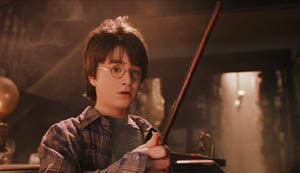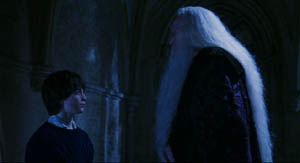|
So named because the powers that be think that Americans are too stupid to know what a philosopher is, or possibly too stupid to spell or pronounce it. They may well be right, but I'd prefer to do without the pandering. 
Based on the first of British author J. K. Rowling's almost preposterously popular series of young adult novels, Sorcerer's Stone introduces us to eleven year-old Harry Potter, an orphan living in a cupboard with his typically evil, or at least uncommonly boorish, step-parents. Harry lives in the cupboard, that is. The evil step-parents, his aunt and uncle, live in the house containing the cupboard and present themselves as individuals made to be despised. One can almost count the moments until the arrival of comeuppance, which arrives in the form of Hagrid, a tall man with bushy hair and matching beard, who tells Harry that he is a wizard by birthright, and has been accepted at Hogwarts school, where all good wizards and witches go to learn their craft. Soon Harry has been spirited away from his manipulatively shitty former life and deposited into a brand-new world; not just one of magic and wonder, but one where nearly everyone knows his name and grants him immediate reverence. If only things worked out that easily for all of us. Hogwarts itself is like a magic-centered theme park with entirely too much money, designed specifically to overstimulate the easily-overstimulated; one can only assume the teachers spike the food with the mystical equivalent of Ritalin to avoid having massive employee turnover due to suicide. Paintings move and talk, stairways constantly shift and realign, and ghosts go wheeling through the place stirring up anyone who somehow wasn't already stirred. Harry learns the reason for his fame is that he's the only person ever to survive an attack from the dreaded Lord Voldemort, a former student gone bad. Why he survived, being only a small child at the time, is a mystery-one senses the mystery. He eventually meets what will become his two best friends, Ron and Hermione, and soon is neck-deep in trouble, though it can hardly be considered his fault when the meadering staircases virtually necessitate his going into parts of the castle supposedly off-limits. 
Let's just face it, shall we? At this point, the story was one being made for kids, about kids, and it shows. The wish-fulfillment nature of the story verges on parody, without the filmmakers seeming to realize it. I lost count of how many times someone new remarked, with a stunned expression, "so you're Harry Potter!" The tropes of writing for the young get a fine workout here; naturally the dorm with the creepy name of Slytherin has the creepy teacher as its head and houses the brattiest kids; again, if real life could be so conveniently laid out for us. The ultimate lesson that the film has is about the importance of courage and love and all that rot-not that such things aren't good, but the screenwriters of the world seem to be laboring under the notion that most people don't already know this. Maybe some don't. Maybe kids who get picked on and treated like crap all the time need to hear such things, though they probably don't need to hear about how one day they'll turn a corner and suddenly be the most important person in the world, because that part's never going to happen. In the final summation, this first Harry Potter film feels less like a story and more like a guided tour of a place where a story could eventually happen. There's a feeling of rushedness about the whole thing, a sense that the film was put out as quickly as possible to capitalize on both the popularity of the book, which continues to ride high, and the success of the Lord of the Rings film series. The effects aren't at the apex of its era's, and the ending feels somewhat underwhelming. But it's only the beginnings of a story that improved as it aged, and how things end is more important than how they start. I've never read word one of any of Rowling's books, and don't know if they read as young as this film adaptation, but in the end I can't be too terribly hard on a story whose central tenant is the significance of friendships; I admit I'm a bit of a sucker for such things. The three young actors playing the trio do a decent job, and fail to be precocious or whiny as child actors often do, although they pale next to veterans such as Richard Harris and Alan Rickman. But unless you're a child yourself, you're likely to regard this film as akin to the first meeting with a potential friend, the awkward introduction that must be waded through in order to eventually reach the parts worth remembering. -review by Matt Murray
|
|
||||||||